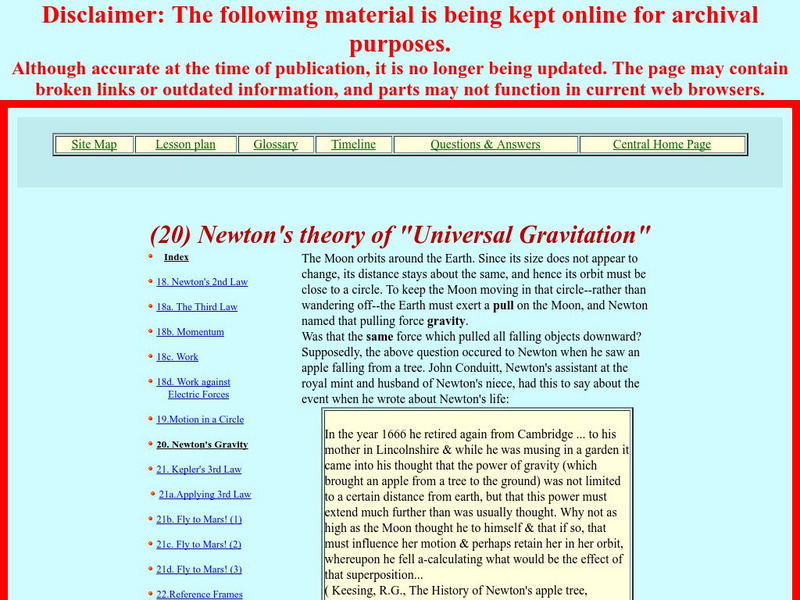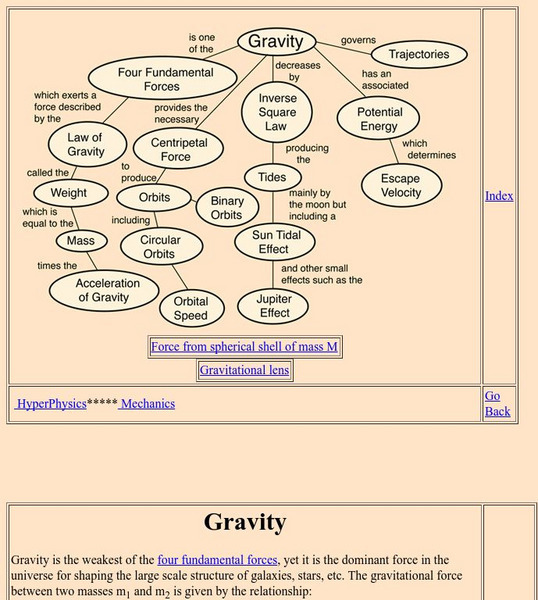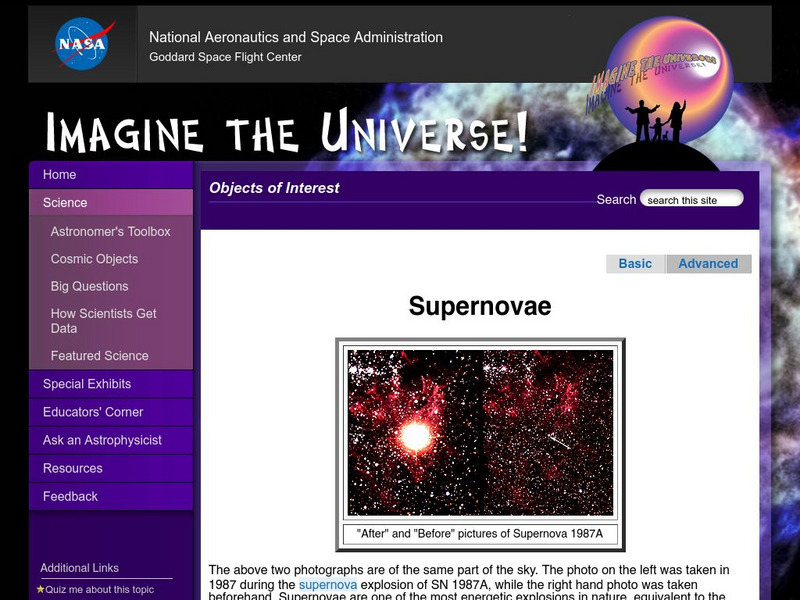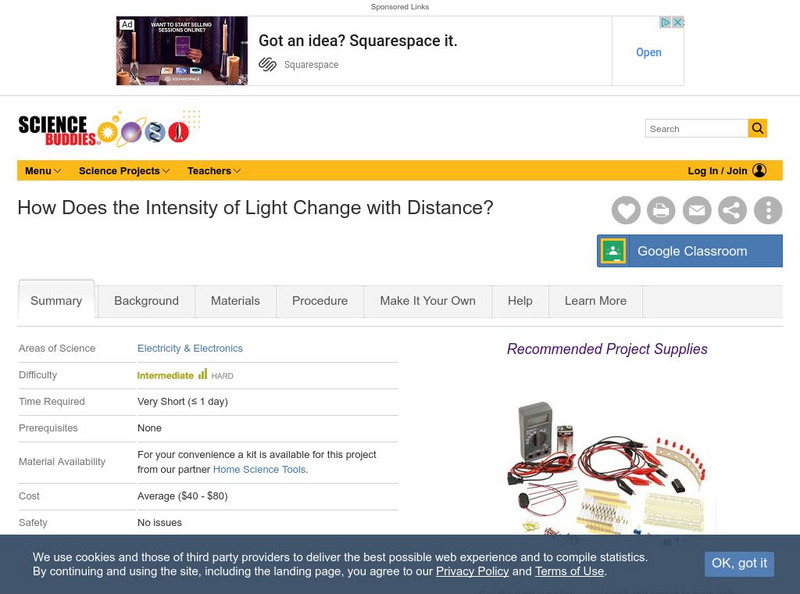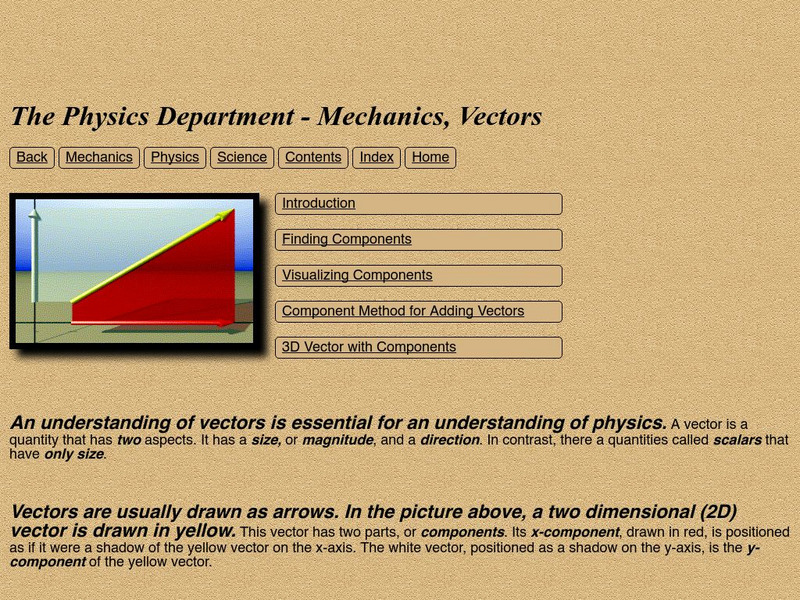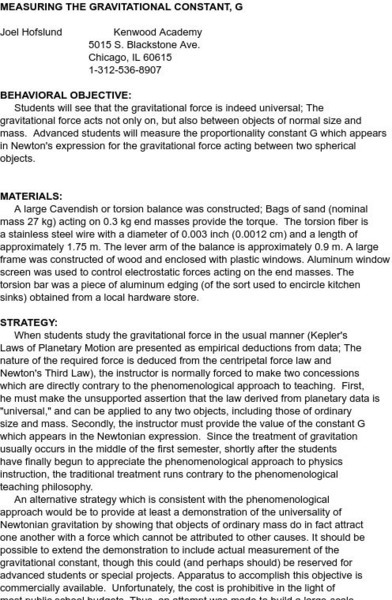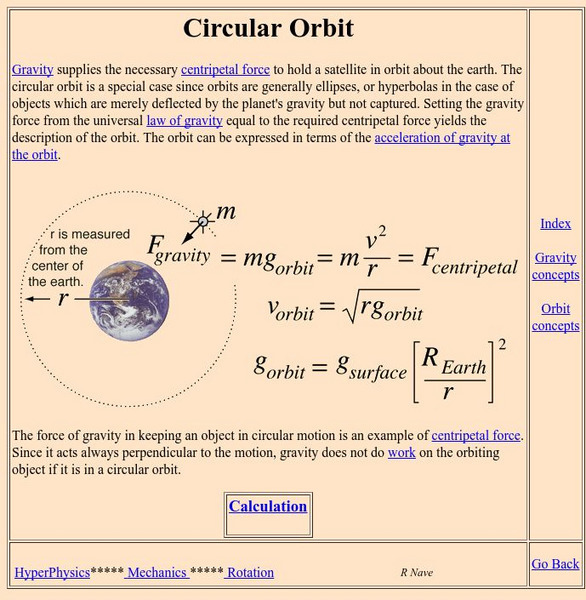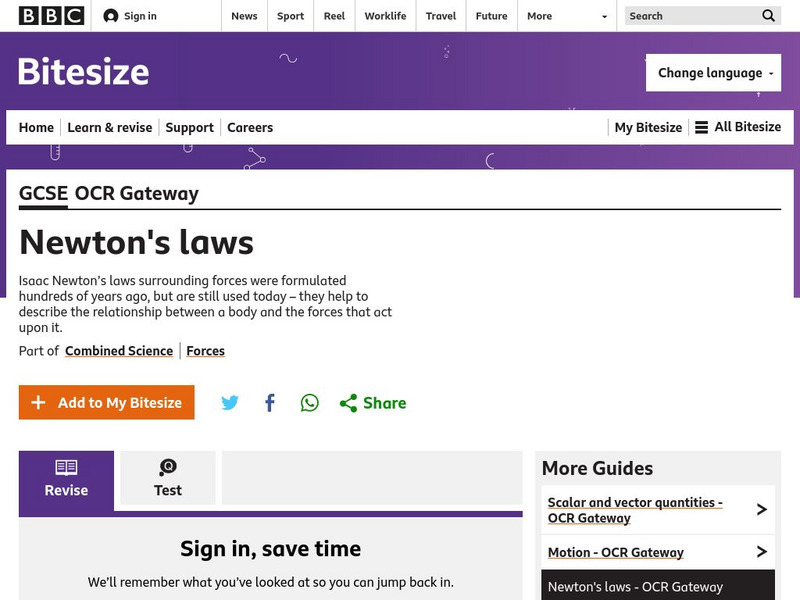Hi, what do you want to do?
NASA
Nasa: Kepler's Second Law
This site from NASA states Kepler's second law of planetary motion and depicts its meaning with an informative diagram. Relates the law to conservation of energy principles and discusses the eccentricity of a satellite's (or a planet's)...
Physics Classroom
The Physics Classroom: Kepler's Second Law
Kepler's second law of planetary motion is stated and explained. An animation of the orbit of a planet and an accompanying graphic assists in explaining the meaning of the law of equal areas.
NASA
Nasa: Newton's Theory of "Universal Gravitation"
This site, which is provided for by NASA, discusses the thinking which led Newton to understand universal gravitation.
Georgia State University
Georgia State University: Hyper Physics: Gravity
Gravity as a fundamental force is explained and an equation for universal gravitation is given.
Physics Classroom
The Physics Classroom: Cavendish and the Value of G
A short description of how Cavendish measured the value of G - the universal gravitation constant and supported Newton's theory. Illustrated.
Other
Personal: The Laws of Motion
This personal site explains the physics of angular momentum and their application to flight. Part of a much larger site on the procedures, principles, and perceptions of flight.
Physics Classroom
The Physics Classroom: Static Electricity: Lesson 3: Inverse Square Law
Electrical force between two electrically charged objects is inversely related to the distance between the two objects. Investigate why this becomes the inverse square law of physics. Engage in the Coulomb's Law interactive and check...
Physics Classroom
The Physics Classroom: Circular and Satellite Motion: Gravitational Fields
Students discover the Law of Universal Gravitation by changing the masses of planets and moons and the distance that separates them.
University of Colorado
University of Colorado: Ph Et Interactive Simulations: Gravity Force Lab
Manipulate the mass and distance of two objects to see how these properties change the gravity force.
TeachEngineering
Teach Engineering: Flying With Style
As students begin to understand the physics behind thrust, drag, and gravity and how these relate these to Newton's three laws of motion, groups assemble and launch the rockets that they designed in the associated lesson.
NASA
Nasa: Imagine the Universe: Supernovae (Advanced)
Supernovae are divided into two basic physical types, including a description of supernova types and how they are classified based on the existence of hydrogen spectral lines. Definitions of key terms are provided.
Science Buddies
Science Buddies: How Does the Intensity of Light Change With Distance?
How far would you have to travel so that the light of the full sun would provide "daylight" no brighter than twilight on Earth? This project describes a method to verify the inverse square law: how light, sound, electrical signals, and...
CK-12 Foundation
Ck 12: Kindergarten Science
[Free Registration/Login may be required to access all resource tools.] A science text for kindergarten that covers the weather and gravity.
NASA
Nasa: Vectors
This site from NASA provides an excellent tutorial on vectors and their use in physics to describe the motion of objects. Vector addition and resolution are illustrated.
Curated OER
Zona Land: Mechanics and Vectors
An exceptional tutorial on the topic of vectors that offers many helpful graphics, some of which are interactive.
Science and Mathematics Initiative for Learning Enhancement (SMILE)
Smile: Measuring the Gravitational Constant, G
A demonstration/lab idea for determining the numerical value of the universal gravitation constant using a torsion balance.
Physics Aviary
Physics Aviary: Practice Problems: Universal Gravity Problem
Students must find out the strength of the gravitational force between two spherical objects based on the size, density and distance between centers.
Physics Aviary
Physics Aviary: Universal Gravity Lab
This lab was designed to allow students to collect data for the force between two objects in deep space. The students are transported by TARDIS to deep space and can use force probes to measure the pull between two objects. Students can...
Georgia State University
Georgia State University: Hyper Physics: Earth Orbits
An equation for the law of universal gravitation is stated. The weight equation (W=m*g) is related to the law. An interactive JavaScript form allows the user to practice determining the force of gravity and the acceleration of gravity...
CK-12 Foundation
Ck 12 Exploration Series: Simulations: Physics: Newton's Cannon
[Free Registration/Login Required] Learn about orbits and how an object can stay in orbit under the influence of gravity. By adjusting launch velocities users will understand how to successfully put a virtual satellite into orbit without...
Georgia Department of Education
Ga Virtual Learning: Physical Science: Force and Motion
In this student-paced module, students apply Newton's Laws of Motion to everyday life, calculate mathematical relationships involving force and motion using algebraic formulas, and understand the difference between mass and weight.
Utah STEM Foundation
Utah Stem Action Center: Angry Birds Are Mad About Physics
Learn about catapults and Newton's laws of motion.
BBC
Bbc: Gcse Bitesize: Newton's Laws
This lesson focuses on Newton's Law for falling objects including terminal velocity, the three stages of falling, a diagram showing what happens to the speed of a skydiver from airplane to ground, velocity-time graphs for falling...
Physics Classroom
The Physics Classroom: Mathematics of Satellite Motion
The mathematics associated with the motion of satellites is described. Equations (for period, velocity, acceleration and force) are stated, symbols described, and sample problems solved. Includes five practice problems with solutions and...
Other popular searches
- Newton Law of Gravity
- Newton's Law of Gravity
- Newtons Law of Gravity
- Universal Law of Gravity
- Law of Gravity Video
- The Law of Gravity







